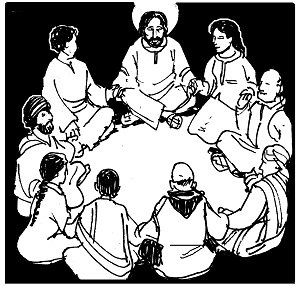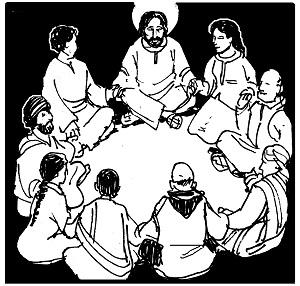

“His disciples came by night and stole him while we were asleep” (Matt 28:12).
Matthew probably composed his Gospel account of the life, death and resurrection of Jesus some 40 to 50 years after the events. The earliest generation of preachers and believers were passing away and new believers were being drawn to his message. Today’s account summarizes the controversy between the Christian community in Antioch and its Jewish critics, who said the so-called resurrection of Jesus was just a bit of grave robbing by the disciples. Matthew counters with a story about witless soldiers bribed by the chief priests to admit they were sleeping on their watch when the disciples stole the body of Jesus.
If we look to the New Testament to get the facts, they are already woven into a theological proclamation being celebrated in the faith community’s liturgies. The belief that Jesus rose and is alive within his followers was already an intense daily encounter and interpretation. For non-believers, it was a CSI (crime scene investigation) pursuing both an earthly event and a theophany beyond time based on an empty tomb and the impact of the memory of Jesus active in his followers.
All the Gospels attest to the resurrection of Jesus as a real encounter with a dead man who is now alive. The church has for 40 years been exploring the fulfillment of prophecies and images from the Hebrew Scriptures that affirm Jesus as the Christ. There were witnesses sharing accounts from both Jerusalem and Galilee of Jesus being with his disciples after his death. In today’s Gospel we find a story of the women meeting him and embracing his feet. Jesus tells them not to be afraid but to tell the others that they will see him in Galilee.
The risen Christ is about more than the first-century appearance stories. We will read many of these accounts this first week of Easter time, then continue to grow into our own call as disciples in the 50 days of the Easter season. We will also explore the story of the birth of the church as the body of Christ in the world. Matthew affirms this when Jesus says that he is going on ahead of his disciples to Galilee, the threshold of the Gentile world where the church was already rapidly expanding.
The implications of the risen Jesus going into the world were made clear three chapters earlier in Matthew’s famous final parable of the last judgment in Chapter 25. Where is Jesus? He is now hidden among the hungry, thirsty, naked, sick, imprisoned and outcast members of the human family. The crucified and risen Christ is there, not in heaven or in some great shrine where pilgrims can come to seek him in prayer. He is with the poor, at the margins of privilege and power. Believers knew that this is where they wii find Jesus.
We have barely had a chance to catch our breath at Easter before the Spirit breathes new life into us and sends us out as missionaries of mercy, agents of reconciliation and service to others. If we want hard proof that Jesus is really alive, this is where we will encounter him, in ourselves and in our communities of faith. He is among us, revealing himself in both ordinary and extraordinary ways. The whole world is now a visible sacrament of his grace at work among us.
Advertisement




